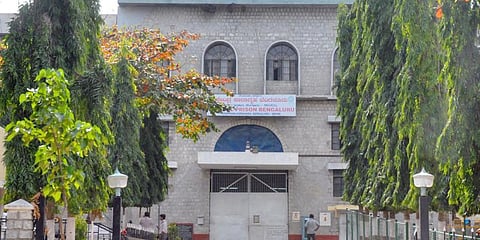

BENGALURU/TIRUCHY/BHUBANESWAR/PATNA: while the rest of the country is trying to beat the coronavirus pandemic with lockdowns, physical distancing norms and personal hygiene, India’s crowded prisons are staring at the prospect of becoming the next big virus clusters.
“It is impossible to maintain social distance among the prisoners inside the cells,” said a senior prison official at Bengaluru’s Parappana Agrahara Central Prison, which houses 4,600 inmates. The jail has reported 51 infections, including six among jail staff. In all, 157 inmates and 24 staff tested positive across nine Central prisons in the state.
In neighbouring Tamil Nadu, 150 prisoners and 92 jail staff have contracted COVID. India’s worst-hit state, Maharashtra, has reported the largest number of positive cases among prisoners at over 800, followed by Assam at 481.
The horrendous state of affairs in jails caught public attention after the Assam Human Rights Commission issued notices to Assam Chief Secretary and the IGP (Prisons) last week, in response to complaints of violation of COVID-19 protocol in jails.
According to experts, the situation in prisons is explosive and the actual infections could be much higher than reported. Many cases go unnoticed due to lack of tests as a large number of patients turn out to be asymptomatic.
It is not that prisons are not doing their bit to contain the virus spread. Thousands of prisoners across the country were released on parole or bail to decongest jails. Most prisons have also taken possible measures to contain infections among inmates and jail staff, but the pandemic is reportedly spreading fast in these high-security zones. Kerala, for instance, don’t send remand prisoners to jails directly. Instead, they are taken to first-line treatment centres, where their swab samples are collected.
Focus on containing COVID spread in prisons
“If they test positive, they are taken to isolation wards of allotted hospitals, where they will be under observation of prison wardens. If negative, they are taken to any of the nine special jail quarantine centres in the state, where they will be in quarantine for 14 days. After that, they will be sent to their respective district jails,” said S Santhosh, DIG (Prisons). Kerala is relatively better off as it has reported only 15 cases so far.
Andhra Pradesh has gone a step further by arranging special jails for remand prisoners, where they will be lodged till their COVID test results turn negative. Acting on similar lines, Karnataka keeps even new inmates who have tested negative under quarantine for three weeks in a separate block. Tamil Nadu has responded to the crisis by ramping up the screening process. Madurai Central Prison, where 28 persons including 15 prisoners have tested positive, now allows prisoners inside only after mandatory tests including thermal scanner. “Till the test results were out, the prisoners were kept in separate blocks inside the prison,” said an official from the prison department.
Odisha, which had 17,812 prisoners as of March 20, has shifted 1,162 inmates to less-crowded jails. Now, under-trial prisoners are initially lodged in isolation wards. It has reported 37 cases among prisoners. Maharashtra has released 10,000 prisoners with imprisonment term below seven years. Assam released 5,767 under-trial prisoners, Uttar Pradesh 18,000 while 6,000 inmates walked out of Chhattisgarh jails.
West Bengal, which has released 12,000 inmates out of 27,000-odd prisoners in phases, has now decided to extend the parole of 3,000-odd convicts by two more months. Plus, the government will not oppose the appeals of 9,000 under-trial prisoners who will seek extension of interim bail. 55 persons, including jail officials, have tested positive.
In Bihar, 31 prisoners have tested positive while four persons succumbed to the virus. 46 jail officials have also tested positive. Tamil Nadu reported one COVID-related death in prison. Punjab, where 70 prisoners tested COVID positive, has started random testing among inmates as well as jail officials. Plus, each prisoner is provided with at least two masks. To keep the further spread of contagion under check, personal visits are suspended while video calling through mobile phones and ePrisons software is allowed.
In Chhattisgarh, jail authorities claim only two inmates have tested positive — one in Bilaspur and another with travel history at Dongarhgarh jail. “Both have been admitted in hospital. The jail premises are routinely sanitised and the health department promptly responds to calls from ailing patients across any jail,” said K K Gupta, DIG - Prisons. In Uttarakhand, six inmates had tested positive but all of them recovered. The state government has released 855 inmates on parole for six months to avoid overcrowding of jails. PVK Prasad, Inspector General of Prisons, said, “We are following safety norms and outsiders’ entry has been prohibited for now.” [With inputs from our bureaux in Chennai, Kochi, Vijayawada, Mumbai, Kolkata, Chandigarh, Lucknow and Dehradun]